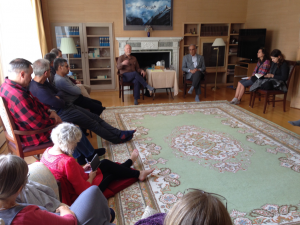Swanwick Star Issue No. 12 (2019)
The Bird in the Verandah (Part VII)
CS – Allan, I propose that there is a locus of tranquility in one’s life while the well of silence is endless and can become an addictive drug; one could easily abide in that tranquility, but just a glimmer of that locus of tranquility is enough to live intelligently. I’d call it a middle path or a happy medium.
AA- Once a Buddhist teacher said “The Middle Way has no middle” meaning that it cannot be quantified or divided. The core of this endeavour is, of course, the display of one’s true nature, or, getting out of one’s own way so that one can see oneself clearly.
CS – I further propose that an intelligent recognition of destructive thought patterns is the core of spirituality.
AA – Yes.
CS – So, we seem to share a consensus but, is that all one needs spiritually?
AA – Yes, that, and, an unwavering resolve to abide in that locus of tranquility as a limitless proposition.
CS – Yes, there is no limit to how aware one can be because Awareness is timeless – it is in the realm of magic and expecting the unexpected; there is an Order that is timeless. However, impatience can be caused by a desire to abide or dwell permanently within that realm or in the locus of tranquility.
AA – St. Augustine said, “The reward of patience is patience”. Anxiety is not innately part of our natures, but tranquility is. Religion and psychoanalysis seem to be more interested in disease than in health.
CS- Yes, it seems so. I recently started to read the Dhammapada, but found I could not finish it…
Do you believe a transformation takes place in the brain as K. talks of to allow Intelligence to function?
AA- Yes, I believe it does.
CS – So, something has changed chemically in the neurons to allow a new way of thinking?
AA – Yes.
* * * * * * * * * * * *
CS – The mysticism of Egypt has always impressed me.
AA – The Sphinx has a lot of presence viewed from many different sides.
CS – Apparently, it came to a Pharaoh in a dream and that’s why it was built.
AA – Oh, really?
CS – I saw it as a child, but I do not recall my impression vividly.
AA – It is good to remember one’s impressions from childhood as they are often fresh.
CS – I shall look up my notes from our trip; it is incredible how pyramids show up in South America, as well, and, this whole business of an idea occurring simultaneously around the world (or a mutation).
AA – Yes.
CS – K. and Bohm talked of 5 or 6 transformed individuals being able to change the world. Why not 2 or 3?
AA – Why not?
[These are personal impressions of dialogues with Professor Allan W. Anderson printed with his permission given on May 23, 2010; in no way does Chanda Siddoo-Atwal (CS) purport that these are verbatim discussions, but only excerpts recalled after conversations in which she has tried to “pluck out” their essence from her notes taken during these talks. It shall be serialized in its entirety as a tribute to his life and work in the coming issues of The Swanwick Star. This is the sixth serial installment from a compilation called “The Bird in the Verandah”]
CS (April 11, 2009)

With Prof. P. Krishna and David Moody (May Retreat)

